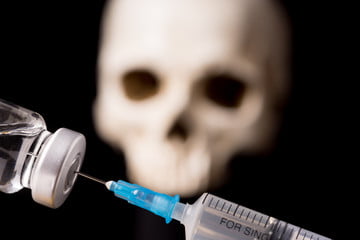
Microbiologist Dr. Kevin McKernan has discovered “unacceptable levels” of double-stranded DNA plasmids floating around Pfizer and Moderna vaccines. Pharmaceutical and medical device R&D executive Sasha Latypova expounded on McKernan’s findings in an interview with “The Freedom Corner with Peter Sweden.”
Latypova said the DNA contamination is a significant problem because the replicable DNA plasmids can invade human cells and bacteria in the gut. This invasion can lead to the replication of antibiotic-resistant genes, sepsis, cancer, and other health issues.
Experts at the World Council for Health (WCH) also confirmed that DNA contamination in mRNA vaccines is a global risk. They said the presence of replicable DNA plasmids in both the monovalent and bivalent vaccines is unacceptable and called for an immediate halt to the COVID-19 vaccine program.
Besides the DNA contamination, McKernan also discovered the presence of Simian virus (SV40) promoters in Pfizer’s mRNA vaccine. The SV40 found in the vaccine is just a viral piece – not the whole virus. However, it still presents a risk of driving cancer.
SV40 was initially found in rhesus monkey kidney cells used to produce both inactivated polio vaccine (IPV) and oral polio vaccine (OPV.) When it was discovered to be an animal carcinogen, a law was passed in 1961 to prohibit its presence in vaccines. (Related: The true story of SV40, the cancer-causing virus hidden in polio vaccines.)
COVID-19 vaccines are disarming people’s immune systems
McKernan warned that there is a lack of quality control in the manufacturing process of Moderna and Pfizer vaccines, and it could pose risks such as anaphylaxis, blood clotting, antibiotic resistance, gene integration, and long-term production of spike protein in the body.
Dr. Mark Trozzi, a Canadian physician and medical researcher, supported McKernan’s findings about the high concentrations of bacterial DNA in Pfizer and Moderna vaccines. In his interview with the New American, he stated that any traces of bacterial plasmids, including that from the Escherichia coli bacteria, should have been filtered out in the final batches of mRNA COVID-19 vaccines.
“Whenever we see DNA contamination, like from plasmids, ending up in any injectable, the first thing people think about is whether there’s any E. coli endotoxin present because that creates anaphylaxis for the injected,” McKernan said.
Meanwhile, a study published in the Multidisciplinary Digital Publishing Institute journal showed that COVID-19 vaccine spike proteins inhibit the ability of damaged DNA to repair itself. “If DNA damage cannot be properly repaired, it will contribute to the amplification of viral infection-induced pathology,” the study authors warned, noting that immunodeficiency is a potential outcome.
“If you get an SV40 promoter in front of an oncogene, you will end up with a high expression of a gene that can drive cancer, it will be a very rare event, but you don’t need many of these cells to be hit with something like this for it to take off. SV40 actually plagued, granted it was the full viral genome, not just the promoter, but this has plagued previous vaccine programs. The polio vaccine is one of them that they were concerned, that this may have contributed to cancer from that vaccine. So, there’s a history of being concerned over SV40,” McKernan said.
Visit BadMedicine.news for more stories about the “dirty” COVID-19 vaccines.
Watch this video that explains how vaccines suppress DNA repair mechanisms in your cells.
https://www.shtfplan.com/headline-news/dirty-shots-dna-contamination-and-cancer-causing-agent-sv40-found-in-mrna-vaccines

No comments:
Post a Comment